|
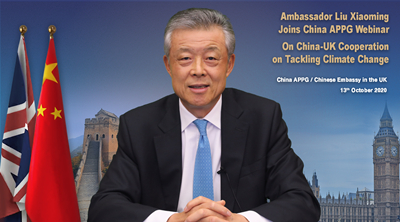
Chairman Graham,
Chairman Dunne,
Sir Laurie,
My Lords and MPs,
Ladies and Gentlemen:
It is a real delight to join you again at the APPCG webinar. Today we will focus on China-UK cooperation on climate change.
The year 2021 will be an important year for joint global response to climate change. China and the UK will host COP15 and COP26 respectively. These are not only important events in China-UK relations but also bear great significance to global cooperation and governance on climate change and environmental protection.
Against the background of the raging Covid-19 pandemic, tackling climate change has become an increasingly urgent task. Mankind faces five major challenges of climate change.
The first challenge is global warming.
Global average temperature is now more than one degree Celsius above pre-industrial levels. The global sea level rise has averaged 5 millimeters per year in recent years. In the future, some places may no longer be suitable for people to live in.
The second challenge is deterioration of the eco-environment.
While creating unprecedented wealth, industrialization has caused serious pollution and posed severe challenges to biodiversity.
The third challenge is Covid-19.
This pandemic has drawn many countries' attention away from climate change. COP15 and COP26 have to be postponed.
The fourth challenge is the imbalance in response capacity.
Compared with developed countries, the impact of climate change on developing countries is more severe.
It remains a daunting task for the international community to redress the imbalance of development between the North and the South and to get everyone on board to tackle climate change.
The fifth challenge is the withdrawal from international treaties and organisations.
A certain country withdrew from the Paris Agreement. Such a unilateral and bullying move has led to severe setbacks in global cooperation and governance on climate change.
Last month, at a high-level UN meeting in commemoration of the 75th anniversary of the founding of the UN, President Xi Jinping announced that China will
· scale up its nationally determined contributions,
· adopt even more forceful policies and measures,
· and strive to peak carbon dioxide emissions by 2030 and achieve carbon neutrality by 2060.
This is an attestation to China's audacity to take up the responsibilities in line with the requirements of sustainable domestic development and the goal of building a community with a shared future for mankind. It is a display of China's firm resolve to make an active response to climate change.
This announcement has been highly commended by the international community. In the words of Prime Minister Boris Johnson, this is "fantastic" and "a powerful signal to the world".
China and the UK are important partners in climate change response and environmental governance. There is enormous potential for closer cooperation between our two countries.
First, China and the UK can join hands and be the champions of global governance on climate change.
China has taken vigorous efforts to implement its National Climate Change Strategy and to fulfill its international obligations under the Paris Agreement.
· From 2005 to 2019, China's carbon emissions per unit GDP dropped by 48.1%.
· The proportion of non-fossil fuel in total energy consumption increased to 15.3%.
· And China has more than half of the world's new energy vehicles.
The UK has set the target of net-zero emissions by 2050.
Hosting COP15 and COP26 respectively will enable China and the UK to play a leading role in promoting global governance on climate change.
President Xi Jinping and Prime Minister Boris Johnson have reached important political consensus on stepping up coordination and mutual support in hosting COP15 and COP26 respectively.
There have been close communications between Minister of Ecology and Environment of China Huang Runqiu and Secretary Alok Sharma.
I myself have stayed in touch with Secretary Sharma and Sir Laurie Bristow, the UK Government's COP26 Regional Ambassador.
At the working level, a China-UK joint working group has been set up.
Going forward, our two sides should enhance communication and coordination, and fully engage the governments, legislatures, business community, media and academia, so as to make these two conferences successful.
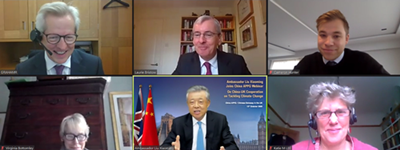
Second, China and the UK can join hands and be the promoters of green development.
Against the ravaging epidemic, the Chinese Government has taken a coordinated approach to economic and social development. We have lost no time in promoting green production and green way of life, and improving the system of climate finance and investment.
The UK has unique strength in clean energy and low-carbon technology.
It is important that China and the UK enhance cooperation in new energy and low-carbon cities. These will enable us to achieve win-win results in both ecological conservation and high-quality economic growth.
China has mature technology and rich experience in the operation and management of clean energy, such as nuclear energy. The Hinkley Point C nuclear power station is a flagship project of China-UK cooperation on clean energy. Upon completion, it will meet 7% of the UK's total demand for electricity and help reduce 9 million tons of CO2 emissions every year. This project is completely in the common interests of both sides. We should work together to make it a success.
Our two countries should also encourage closer cooperation between our industries in renewable energy, green finance and green Belt and Road. This will help boost green recovery in both our two countries and the rest of the world.
Third, China and the UK can join hands and be the pioneers of green innovation.
Both China and the UK are pursuing innovative development in green technology, energy and financial services.
In clean energy, our two countries have signed the Clean Energy Partnership Work Plan for 2019-2020 to step up cooperation on the relevant technologies.
In green finance, China and the UK have signed up to the Green Investment Principles for the Belt and Road Development. There will be huge potential for cooperation in this aspect.
In green transport, Chinese companies Geely and BYD have actively invested in the UK, becoming shining examples of China-UK cooperation on green transport.
Fourth, China and the UK can join hands and be the defenders of multilateralism.
It is important that China and the UK stand up for multilateralism. Under the principles of common but differentiated responsibilities, equity and respective capabilities, China and the UK should make utmost efforts to
· implement the nationally determined contributions,
· contribute to the comprehensive, balanced and effective implementation of the Paris Agreement,
· help developing countries scale up capacity building,
· deepen international cooperation,
· improve the governance system,
· and chart the course for global governance on climate change.
Ladies and Gentlemen:
Tackling climate change and protecting biodiversity are important areas of China-UK cooperation. They are also our mission as major global players.
As President Xi Jinping said at the UN high-level meeting,
(quote) "We need to take up our lofty responsibility for the entire human civilization, and we need to respect Nature, follow its laws and protect it. We need to find a way for man and Nature to live in harmony, balance and coordinate economic development and ecological protection, and work together to build a prosperous, clean and beautiful world." (end quote)
The UK Parliament plays an important part in the UK's response to climate change. It is my sincere hope that you will continue playing a positive role and supporting green cooperation between our governments and businesses. I also look forward to your thoughts and ideas on hosting successful COP15 and COP26.
Let's work together to make greater contribution to building a community with a shared future for mankind and making our planet a better home for all!
Thank you!
Now I am ready to take your questions.
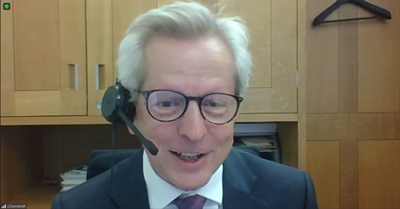
Richard Graham: One of our speakers raised the question about whether the COP 15 conference in Kunming will be able to go ahead on the current plan timing given the current situation of Covid-19. How confident are you that it will be able to go ahead as planned?
Ambassador Liu: I'm very confident about that. We are still seven months away from the conference, and in China, life has returned to normal and production and social work also have resumed. Of course, we are following the pandemic, both at home and around the world, very closely. As President Xi Jinping said at the UN Summit on Biodiversity, "I want to welcome you to Kunming, the beautiful 'Spring City', next year, to discuss and draw up plans together for protecting global biodiversity." "Now, let us work in concert to build a beautiful world of harmony among all beings on the planet."
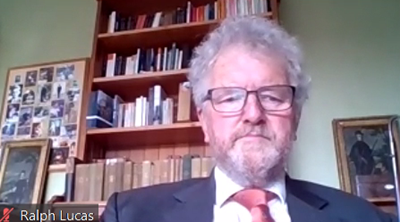
Lord Lucas: What are your suggestions on further China-UK cooperation in new energy, in particular new energy vehicles?
Ambassador Liu: On the electric vehicle we'll be more than happy to carry out mutually-beneficial cooperation with the UK. By the end of 2019, China owned 3.81 million new energy vehicles, which accounted for more than half of the world's total. The annual increment has been over one million for two years in a row, making China a world leader in this aspect. Both the electric buses produced by BYD and the all-electric cabs produced by Geely here in the UK after investing in the London Taxi Company have contributed to carbon emission reduction here in this country. China is also the largest investor in renewable energy. We have made vigorous efforts to develop solar and wind power. I believe there are enormous opportunities and huge potential for China and the UK to work together in the relevant areas.
Lord Lucas: How do you see the prospects of China-UK cooperation in nuclear power?
Ambassador Liu: China has mature technologies and rich operation and management experience in nuclear power. China stands ready to enhance cooperation with the UK in this area. As of the end of 2019, China had the world's third largest installed capacity after only the United States and France. We had 47 nuclear power units with a total capacity of 48.75 million kilowatts. The Hinkley Point C project is an important flagship project in nuclear power involving China, France and the UK. It will help the UK realize its net-zero emission target by 2050. Though there are some noises, it is my hope that our two sides will resist these disruptions and work together to promote this important project.

Sir Geoffrey Clifton-Brown: The UK is phased out on its coal-fired power stations. In order to meet the 2060 target, when will China phase out all of its coal-fired power stations?
Ambassador Liu: In China, we are phasing out coal-fired power station gradually. But we can't give you a date on that because China is still a developing country. We have enormous challenges facing us in terms of development. China is a large country and its development is imbalanced and inadequate. After my ambassadorship in Egypt, I was seconded as Assistant Governor to Gansu province, one of the poorest provinces in western China, which is very much dependent on coal energy. So, we have to address the imbalance of economic growth. On the other side, we also have to gradually scale down the consumption of coal to meet our targets on CO2 emission. So it will take time, but the commitment of achieving carbon neutrality by 2060 is there. Once we set a target, the policies will follow through. There will be a gradual scale-down of the fossil energy consumption through the green energy technologies. We have built the world's largest clean coal supply system. We have more than 800 million kilowatts of coal-fired ultra-low emission units. We lead the world in emission standards. China has set an example for the world in the clean application of coal. We encourage green consumption, green innovation and green development. When we have all these combined, we are confident that the fossil energy consumption will be reduced gradually so as to promote green and high-quality development.
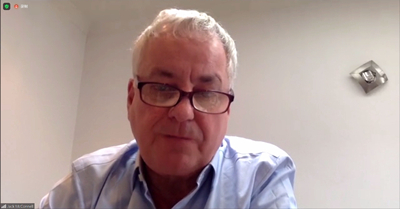
Lord McConnell: I have one question on Belt and Road Initiative projects. Do you think the BRI projects could reduce or indeed eliminate financing projects on coal energy in various BRI countries, like Pakistan and so on?
Ambassador Liu: The Belt and Road Initiative is not only a road to economic prosperity but also a road to green development. China has always adhered to the green concept in BRI development, promoting green and low-carbon infrastructure and operation management, emphasizing ecological conservation in investment and trade, and strengthening cooperation in the fields of ecological environment governance, biodiversity protection and climate change.
In 2019, China jointly initiated BRI International Green Development Coalition with more than 140 partners in 42 countries. We have implemented the Belt and Road South-South Cooperation Initiative on Climate Change. Since 2012, the annual expenditure on South-South climate cooperation has reached 72 million U.S. dollars.
We are attaching great importance to green development and biodiversity regarding BRI, both in terms of the project design and the project implementation. For instance, you mentioned Pakistan. When Chinese companies built Karachi-Lahore Highway in Pakistan, they planted nearly 300,000 trees and more than 5 million square meters of grass land along the road. Along with new road infrastructure, they also contributed to the local environment.
China will adhere to the concept of open, green and sustainable development, and work with BRI partners to build a green "Belt and Road". We have actively carried out third-party market cooperation with developed countries including the United Kingdom on building a green Belt and Road, pooling more efforts in international cooperation on climate change.
Lord McConnell: I wonder, in relation to both of the summits planned for next year, if there are concrete plans in place to engage with global multinationals, more than just a sponsorship level, and what are the preparations for that?
Ambassador Liu: We believe private sectors are important forces in environment protection and green development. We encourage private sector and business, academia, and media to participate in both COP15 and COP26.In the COP15, there will be a series of fringe events involving businesses from all over the world and local governments. I had a very good conversation with the Lord Mayor of London, discussing how the businesses of our two countries can work together on green finance to support the two conferences. For the COP26, in addition to sending Chinese government delegation, we're going to set up the China Pavilion, which would involve Chinese local governments, NGOs and other institutions. I told our business people that I hope they will take up their responsibilities, seize the opportunities and strengthen cooperation with their British partners. I hope there will be more collaboration between our businesses on existing projects and on finding new projects for green development so as to promote global sustainable development.
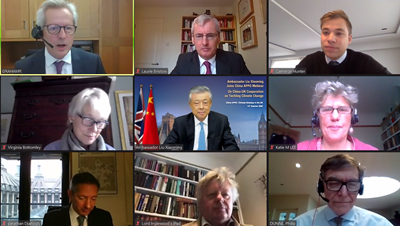
|

